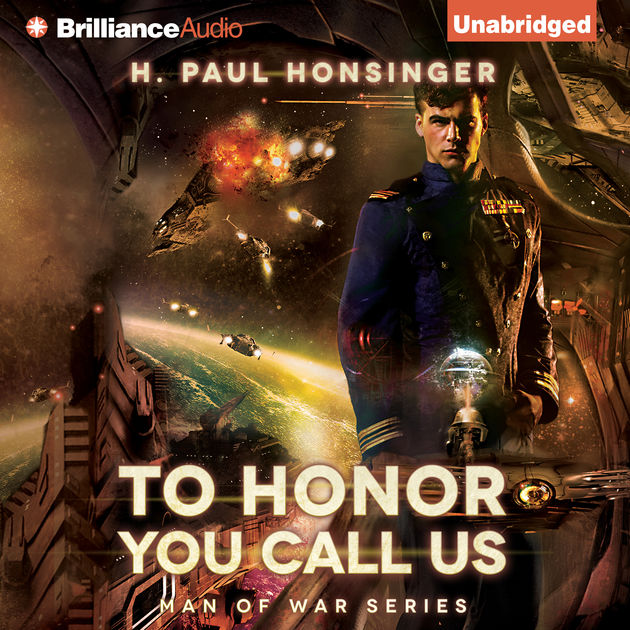To Honor You Call Us (2014)
Written By: H. Paul Honsinger
Genre: Military Science-Fiction
Length: 13 hours and 3 minutes (Audiobook)
Series: Man of War series (Book 1)
Publisher: 47North
Why I Chose It: This was described as “Master and Commander in space.” I grew up on Master and Commander and Horatio Hornblower courtesy of my dad, and I loved the idea of this genre mashup.
The premise:
The Terran Union is engaged in a vast interstellar war against the Krag, ruthless aliens intent on exterminating humankind. In 2315, the wily Max Robichaux is given command of the USS Cumberland, a destroyer with state-of-the-art capabilities but a combat record so bad, she’s known as the “Cumberland Gap.”
Capt. Robichaux’s first mission: to take his warship to the Free Corridor, where the Krag have secretly been buying strategic materials, and to seize or destroy any ships carrying enemy cargo. Far from the fleet and under enforced radio silence, Max relies only on his determination and guile…and the support and friendship of his chief medical officer, the brilliant Dr. Sahin.
Because even as he deals with the ship’s onboard problems and the stress of carrying out her risky assignment, Max and the doctor discover that the Cumberland and her misfit crew are all that stands in the way of a deadly Krag attack that threatens to end the war—and humanity—once and for all.
A far-future story in the tradition of “ships of wood, men of iron” novels, To Honor You Call Us and the Man of War series combines the adventure of exploration, the excitement of war, and the dangers of the unknown through the eyes of a ship and her crew.
Spoiler Free!
Discussion: First off, I really loved the premise of this book. Junior officer gets thrown into the deep end of an intergalactic war and has to earn the respect of his superior officers and crew? Sign me up. I wanted space battles and bad aliens and clever tactics. And in the end, that’s what the book delivered. But it really was the only thing it delivered.
Somehow in a book full of war and aliens and space battles there was no conflict. All those spaceship skirmishes were easily won. The clever tactics managed to be too clever. Robichaux was so brilliant he always managed to stay one step ahead of the bad guys. They never got the drop on him, he never screwed up or failed to have some cunning plan. He was never challenged or forced to grow, which ended up undermining his strengths, turning him into a fairly blasé action hero.
I could get behind a futuristic navy still using cutlasses. I could even understand an entire book without a single female character. I didn’t like it, but the explanation made enough sense within the story that I could accept it with some grumbles. But I couldn’t enjoy a book with no conflict. Robichaux was just too good making it all too easy.
To be fair, sometimes I like easy. Easy can be relaxing. But not this time. I felt like the book took itself too seriously for that.
The writing just lacked the sophistication to support the weaknesses faced in the plot. The dialogue tended to be long and arduous, serving as unnecessary explanation and review. “So, what’s our plan?” says one character. “Well, as you know, this [insert science-y thing] works this way,” says another. “What way?” “Oh, here let me show you.”
All of which was interspersed with overwrought emotion that I didn’t feel like the weak conflict had earned. I like the idea of a more emotional military science fiction but this became too much. Or maybe it didn’t go far enough. By the end my half joking/half serious battle cry was “Just kiss him already!” Honestly, if this had turned into a romance between the captain and the doctor all the over done affirmations and conversations of “I’m so horrible,” “No you’re not, I’m so horrible,” would have fit better and actually had some payoff. As it was, their friendship felt too gooey for the situation.
My husband and I actually listened to this on a road trip. I’d been looking for something we could both enjoy and figured naval science fiction would be perfect. Unfortunately, he’s an engineer-type with a cynical streak and while I poked holes in the writing, he poked holes in the logic.
However, one saving grace for the audio version: the narrator was excellent. Ray Chase went a long way toward making this book more palatable.
In Conclusion: I’m afraid I went into this one with too many expectations. If I’d just been looking for something light and entertaining, To Honor You Call Us would have fit the bill perfectly. But I couldn’t help thinking it could have been so much more.

Hi Kendra, have you tried “The Guns Above” by Robyn Bennis? Or the Serrano books by Elizabeth Moon?